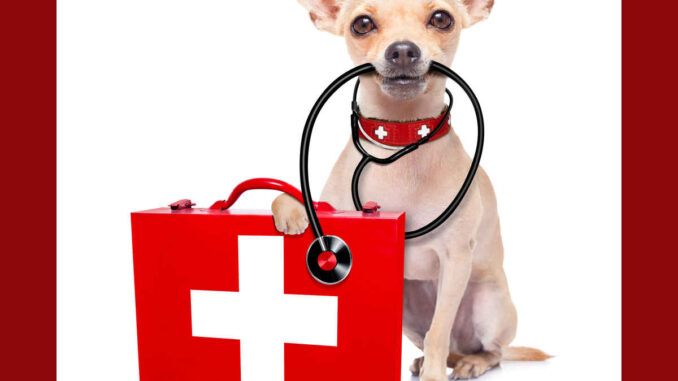
This article was updated on May 5th, 2023
Diarrhea is one of the most common complaints that I face as an emergency veterinarian.
Dogs are notorious for getting into trouble by eating things they shouldn’t. As pet owners, we are often guilty of sharing table foods or feeding one too many treats. This is why diarrhea can be so common. There are also a variety of medical issues that can cause diarrhea, so it is important to be vigilant.

When your dog is having diarrhea you may wonder if this can be treated with at-home treatments for diarrhea, or is this an emergency that should see a veterinarian right away. This article is an easy way to determine if your dog’s diarrhea is an emergency.
While diarrhea does not sound like an emergency, I have seen many dogs come into my hospital with severe diarrhea that leads to life-threatening consequences. An all too common disease process we see is called Acute Hemorrhagic Diarrhea Syndrome or Hemorrhagic Gastroenteritis. This illness is named because dogs with this condition will develop severe, bloody diarrhea. They can have such severe diarrhea that their blood pressure, blood sugar, and red blood cell counts can drop to dangerously low levels. These dogs can be critically ill and need treatment in the Instant Care Unit (ICU).
I have treated countless dogs with this condition and almost all have recovered with prompt, aggressive veterinary care. This is why it is so important to know when to seek medical attention for your dog with diarrhea.
Signs you can treat your dog at home first
Not all dogs with diarrhea require medical intervention. Any dog who has very mild or self-limiting diarrhea can be treated at home. This can at least be done short-term to assess their response to simple home remedies.
- A single episode of diarrhea is not an emergency.
- Pudding-like diarrhea or cow paddy stools are not considered urgent unless they are continuing for a prolonged period.
- A small amount of diarrhea after changing a diet or deworming treatment can be expected.
- Diarrhea after stressful events is also common in dogs and will usually resolve without intervention.
There are plenty of home remedies that can be performed at home after diarrhea develops that can potentially improve the issue. My favorite remedies are:
- Bland diet: Feeding boiled chicken or ground beef alongside boiled rice can help settle the tummy and improve stools.
- Probiotics: These can be purchased over the counter or from your veterinarian. Good bacteria can help combat the overgrowth of bad bacteria that can cause diarrhea
- Fiber: Adding a fiber supplement to the diet can help improve diarrhea. I recommend psyllium husk or unsweetened canned pumpkin (read: How Fast Does Pumpkin Help a Dog with Diarrhea?)
- Avoid fatty foods or treats: Limit intake of food items that can cause diarrhea such as high-fat foods like peanut butter, bacon, or cheese. Take away marrow bones and limit intake of treats.
For more tips, read our article: Dog with Diarrhea: 8 Easy Tips from a Vet. Let’s now discuss the signs that you need to see your vet, and signs that your dog’s diarrhea is an emergency.
Signs you need to schedule an appointment with your veterinarian

Now that we discussed when diarrhea is not concerning, here is a list of signs that you should schedule a non-urgent vet appointment:
- Chronic, soft stools without vomiting
- Diarrhea with evidence of worms
- Diarrhea more than 3 times in an otherwise energetic dog who is eating and drinking normally
- Diarrhea that occurs after the introduction of normal dog food and doesn’t improve – i.e. dietary intolerance
- Waxing and waning diarrhea
- One to two episodes of vomiting alongside diarrhea
Many causes of diarrhea can wait until your veterinary office is open and you can make an appointment. This is true as long as your pup is otherwise behaving normally, is able to stay hydrated, and does not have underlying health problems.
Signs you need to seek emergency treatment for your dog’s diarrhea
Sometimes vomiting and diarrhea can be an emergency. These are some signs that you need to go to the emergency vet right away:
- Vomiting for more than 24 hours or vomiting that is ongoing despite withholding food: Protracted vomiting is scary and may be a clear sign that something more serious is underlying. Most simple causes of an upset tummy will resolve by withholding food for 12 hours. If this is not the case, something more serious may be going on.
- Having liquid diarrhea more than 5 times in one day: Significant diarrhea can lead to dehydration. If left untreated, dehydration can become life-threatening and lead to dangerously low blood pressure.
- Bloody vomit or diarrhea: Blood in the vomit or bloody diarrhea (even if your dog acts normal) may mean that serious inflammation is happening in your dog’s gut. While a single episode of a small amount of blood in the vomit or feces is not a dire emergency, large amounts of blood is. This could be a sign of internal bleeding.
- Vomiting or diarrhea in young puppies: Young animals do not have the same reserves to combat illness as adult animals do. Puppies can become dangerously ill after only a few episodes of vomiting and diarrhea. There are also lethal diseases that cause diarrhea in puppies that require immediate treatment.
- Trouble breathing: Breathing changes after vomiting may be an indication of the aspiration of stomach contents. This can lead to pneumonia which can be life-threatening if left untreated.
- Pale or blue gums: Pale gums may indicate that blood pressure is very low or your dog is anemic. Blue gums indicate that your dog is not oxygenating appropriately. These are dire emergencies.
- Extremely lethargic and unresponsive: These may be signs of severe dehydration, shock, or other serious consequences of untreated vomiting and diarrhea. Get your dog to a veterinary hospital ASAP.
These cases will need quick medical intervention by your veterinarian for your dog to fully recover.
Can a dog die if these “emergency symptoms” are seen?
Absolutely! Dogs are resilient creatures but can succumb to severe illness if left untreated. Prolonged diarrhea can cause dehydration. Bloody stool can cause anemia. Severe inflammation of the colon that occurs with these signs can lead to bacteria leaching into the abdomen leading to sepsis. Young puppies can become critically ill from dehydration or low blood sugar. This is why it is so important to keep a close eye on any pet with diarrhea and respond promptly.
What could happen if my dog needs emergency help, but we decide to wait until regular business hours at my vet’s office?
If your dog needs urgent care and you elect to wait, they may become even sicker, making it harder for your veterinarian to treat them, or be successful. Prolonged illness can lead to your dog being in a worse condition. This means more aggressive care is required which ultimately comes at a higher cost.
What is the prognosis for dogs with emergency cases of diarrhea?
The prognosis is generally good to great if diarrhea is addressed quickly and the underlying issue is treated. Ultimately, it depends on the cause of diarrhea and how severe your dog’s condition is. Dogs rarely die of diarrhea.
How will a veterinarian treat my dog with diarrhea?
Veterinarian treatment options include:
- Intravenous or subcutaneous fluids: Fluids are pivotal to help reverse and prevent dehydration. Fluids can be given under the skin if your dog is stable enough to go home. If they will be kept in hospital, fluids will be given intravenously to immediately take effect.
- Anti-nausea medication: Many causes of diarrhea often lead to nausea. Your vet will discuss options for anti-nausea medications if needed depending on how severe your dog’s nausea is.
- Diarrhea treatments: There are various medications and supplements used to treat diarrhea. Metronidazole or Tylan are commonly used. Probiotics can help combat bad bacterial overgrowth.
- Antibiotics: For severe cases of diarrhea, antibiotics may be given to help prevent life-threatening translocation of bacteria from the bowel.
- Deworming agents: If parasites are suspected, your vet will likely recommend a deworming treatment which may help resolve diarrhea.
- Diet trial: One of the mainstays of diarrhea management is a bland diet. There are various veterinary prescription diets that your vet may recommend to help alleviate diarrhea.
What’s the cost of veterinary treatment for dog diarrhea?
Outpatient treatment for diarrhea is generally inexpensive. Medications to treat diarrhea don’t usually cost more than $30-50. If your dog needs fluids under their skin to support hydration, fecal testing, and anti-nausea medication, the cost of your visit may be a few hundred dollars.
Urgent or emergent care at an emergency facility will be more expensive with the visit alone usually costing anywhere from $100-200. If your dog is ill enough to require hospitalization, expect a bill anywhere from $800 to upwards of several thousand if they are critically ill.
Ultimately, the cost of care is determined by what treatments your dog needs and the demographic of your area of residence. The cost of care is much more affordable in rural areas as opposed to a big city like New York. This is why pet insurance is so important. You never know when your pet will fall ill, so it’s best to always be prepared.
Related posts:
Other posts by Dr. Paula Simons:
Dog Bleeding from Butt? Our Vet Shares What to Do
Dog’s Anus is Red or Inflamed: Here is What to Do
Disclaimer: This website's content is not a substitute for veterinary care. Always consult with your veterinarian for healthcare decisions. Read More.















Be the first to comment